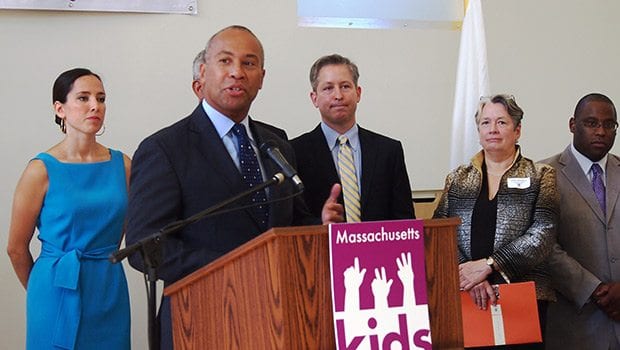Casey Foundation report shows Mass. leads nation in children’s education, health care

Years of public investment in early education, health care and child services have paid off for Massachusetts, Gov. Deval Patrick said Tuesday during a press conference announcing the state’s top ranking in a 50-state survey on child wellbeing by the Annie E. Casey Foundation KIDS COUNT project.
According to the report, 99 percent of children in the Commonwealth have access to health insurance. Massachusetts also leads the nation with a 47 percent proficiency rate for fourth grade readers. While one third of Massachusetts’s children live in a household that is struggling to afford housing, the Bay State is home to the lowest child poverty rates in the United States.
“We have achieved this success and more thanks to a lot of hard work and collaboration from diverse partners throughout the state,” Governor Deval Patrick said in a press release. “I am proud of the progress Massachusetts has made in creating greater opportunity for our children to thrive and succeed, from affordable health care coverage to access to high-quality education, but there is still more work to do. We will continue to invest in our children to help shape the future they deserve.”
The Casey Foundation’s book tracks the wellbeing of children in Massachusetts across economic, education, health and family and community data on a state and national level. July 22 marks the 25th edition of the data book.
“The investments we have made in our children have helped them to be better prepared to succeed than children anywhere else in America,” Noah Berger, President of MassBudget, the Massachusetts KIDS COUNT group said in a press release.
“Yet, far too many of our children are still being left behind. Working together, through our government, we can make sure that all of our kids have access, from their earliest days, to the basic supports they need to thrive.”
According to the report, one in seven children live in poverty in the Bay State, compared to the national rate of one out of five children. The data shows that while children in Massachusetts have access to health insurance and healthcare, they are just as likely to abuse drugs and alcohol here as kids living anywhere else in the country.
“Here in the Commonwealth, we have made a strong commitment to the well-being of our children, and this is largely due to our emphasis on education and healthcare,” Senate President Therese Murray said in a press release. “This report shows that these investments have paid off and we remain national leaders in child achievement standards. However, we also have a responsibility to continue finding ways to improve the lives of children and to recognize that their success is absolutely essential for Massachusetts’ success as a whole.”
Health Care for All Executive Director Amy Whitcomb Slemmer attributed the state’s high ranking in healthcare outcomes to the state’s Affordable Care Act, which mandates health care coverage for all state residents and provides free care for those unable to pay.
“We decided that health care is a human right,” she said. “We also decided we would take care of people who are not being provided for.”
Berger said there is much work to be done to provide every child with a chance to succeed, and improving our schools and the system of support for at-risk children and those in the juvenile justice system are crucial to breaking down the barriers that hold too many children back.
“We can also pursue economic policies that help low-income families earn decent wages and have incomes that let them provide a better life for their children,” Berger said. “In the long run, expanding economic opportunity for all of our kids and families is likely the most effective way to build a strong economy that works for everyone.”






